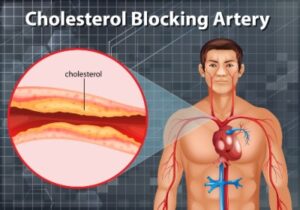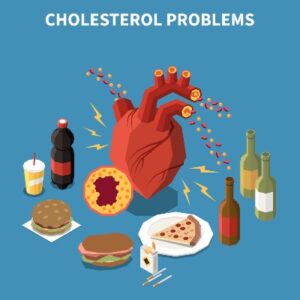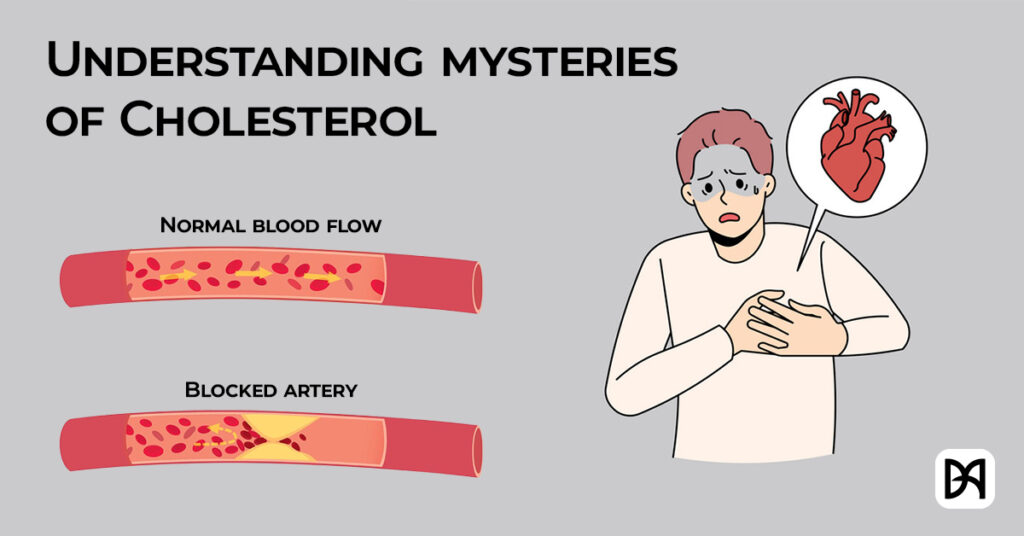High cholesterol is a common condition with the potential to develop into serious health issues, including heart disease, stroke, and peripheral artery disease. Understanding what this is, how it impacts your health, and how to manage it is important.
This comprehensive guide digs deep into the world of high cholesterol, providing you with the knowledge and tools to navigate this condition effectively.
Table of Contents
ToggleWhat is Cholesterol?
Cholesterol, a waxy, fat-like substance, plays an essential role in various body functions. While your body naturally produces it in the liver, you also consume it through certain foods. Cholesterol travels throughout your bloodstream via lipoproteins, which are particles that transport it.
Types of Cholesterol
Two main types of cholesterol exist:
- Low-density lipoprotein (LDL): Often referred to as “bad” cholesterol, LDL can build up within your arteries, potentially leading to blockages.
- High-density lipoprotein (HDL): Known as “good” cholesterol, HDL assists in removing LDL cholesterol from the arteries and transporting it back to the liver.
Symptoms and Causes of High Cholesterol
Unfortunately, high cholesterol often goes undetected due to its absence of prominent symptoms. Regular cholesterol check ups are crucial for early detection and intervention.
Several factors can contribute to this, including:
- Diet: Excessive intake of saturated and trans fats, cholesterol, and processed foods can increase LDL levels.
- Physical inactivity: Insufficient exercise can both elevate LDL and lower HDL levels.
- Obesity: Carrying excess weight increases the risk of developing cholesterol.
- Smoking: Smoking damages blood vessels and can contribute to higher LDL levels.
- Diabetes: This condition can raise LDL and lower HDL cholesterol levels.
- Family history: Individuals with a family history of cholesterol are at increased risk.
The Importance of Checking Your Levels
A simple blood test, known as a lipid panel, is the only way to determine your cholesterol levels. This test measures your total cholesterol, LDL, HDL, and triglycerides, another type of fat found in the blood.
Guidelines and Risk Factors
The American Heart Association (AHA) recommends the following cholesterol levels for adults:
- Total cholesterol: less than 200 mg/dL
- LDL cholesterol: less than 100 mg/dL
- HDL cholesterol: 60 mg/dL or higher
- Triglycerides: less than 150 mg/dL
Several factors beyond the causes of high cholesterol can increase your risk, including:
- Age: The risk of developing high cholesterol increases with age.
- Gender: Men are generally more prone to High Cholesterol than women.
- Menopause: Women experience an increased risk of high cholesterol post-menopause.
Complications
If left untreated, high cholesterol can lead to severe health complications, including:
- Heart disease: High cholesterol is a major risk factor for heart disease, the leading cause of death in the United States.
- Stroke: This condition, the third leading cause of death in the United States, can also be caused by high cholesterol.
- Peripheral artery disease: This condition affects the blood vessels in your legs and can be a consequence of high cholesterol.
Treatment and Prevention of High Cholesterol
Several strategies exist for managing:
- Lifestyle changes: Eating a healthy diet, incorporating regular exercise, and maintaining a healthy weight are crucial lifestyle changes for managing cholesterol.
- Medications: Various medications, including statins, bile acid resins, and PCSK9 inhibitors, can assist in lowering cholesterol levels.
Preventing high cholesterol is also possible through several measures:

- Maintaining a healthy diet: Prioritize fruits, vegetables, and whole grains, while limiting saturated and trans fats, cholesterol, and processed foods.
- Exercising regularly: Aim for at least 30 minutes of moderate-intensity exercise most days of the week.
- Maintaining a healthy weight: Losing weight, even a small amount, can significantly improve Cholesterol Levels if you are overweight or obese.
- Smoking cessation: Smoking significantly increases your risk of high cholesterol. Quitting smoking is crucial for overall health improvement.
- Managing other health conditions: Working closely with your physician to manage conditions like diabetes, which can increase your risk of high cholesterol, is essential.
Conclusion
While high cholesterol can be a serious health concern, early detection and intervention are key to managing it effectively. By understanding what this is, its causes, and its potential consequences, you can take steps towards maintaining a healthy heart and overall well-being. Remember, adopting a healthy lifestyle, including a balanced diet and regular exercise, is crucial for managing cholesterol and reducing your risk of developing associated health issues.




